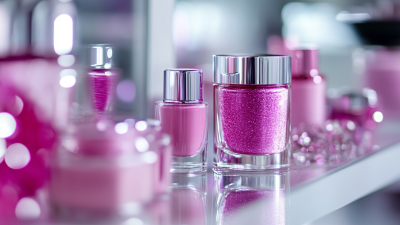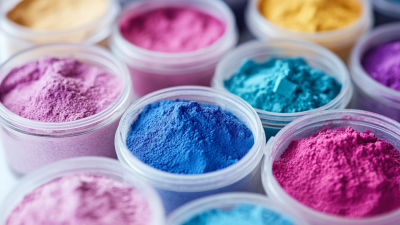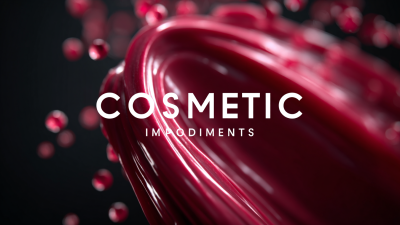In the realm of skincare, the significance of Cosmetic Ingredients is often underestimated, yet they play a pivotal role in determining the health and appearance of our skin. According to a report by Statista, the global skincare market is projected to reach approximately $189.3 billion by 2025, highlighting an increasing consumer awareness and demand for effective formulations. Moreover, a study published in the Journal of Cosmetic Dermatology found that certain ingredients, such as hyaluronic acid and retinoids, can significantly improve skin hydration and reduce signs of aging, thus enhancing the overall skin health. With a plethora of products available, understanding how to choose the best Cosmetic Ingredients tailored to individual skin types and concerns is crucial. This guide aims to demystify the complexities of cosmetic formulations and provide practical insights into selecting the most beneficial ingredients for radiant and healthy skin.

Understanding your skin type is crucial in selecting the best cosmetic ingredients for healthy skin. Different skin types—such as oily, dry, combination, and sensitive—have unique characteristics and needs.
For instance, oily skin may benefit from lightweight, non-comedogenic ingredients that regulate sebum production, such as salicylic acid and tea tree oil. Conversely, dry skin requires hydrating ingredients like hyaluronic acid and glycerin to restore moisture balance.
Moreover, combination skin often calls for a tailored approach, utilizing ingredients that can address both oily and dry areas without exacerbating either condition. Sensitive skin, on the other hand, thrives on gentle, soothing ingredients such as aloe vera and chamomile extracts, which help to calm irritation and redness. By understanding your specific skin type and its reactions to various ingredients, you can more effectively curate a skincare routine that promotes health and radiance, allowing you to unlock the secrets to truly effective cosmetic choices.
When it comes to achieving healthy, hydrated skin, understanding the role of key ingredients is paramount. Two standout players in the realm of moisturization are hyaluronic acid and glycerin. Hyaluronic acid, a naturally occurring substance in our bodies, can hold up to 1,000 times its weight in water, making it an exceptional humectant. According to a study published in the Journal of Clinical and Cosmetic Dermatology, products containing hyaluronic acid can significantly enhance skin hydration levels, reduce fine lines, and improve overall skin texture.
Glycerin, another powerful hydrating agent, is well-regarded for its skin-soothing properties. As reported by the International Journal of Cosmetic Science, glycerin acts by drawing moisture from the environment into the skin, thus maintaining optimal hydration levels. This ingredient not only helps in retaining moisture but also aids in strengthening the skin barrier. Combined, hyaluronic acid and glycerin form a synergistic duo that provides deep hydration, ensuring that skin remains plump and youthful. Choosing products that incorporate these ingredients can lead to a marked improvement in skin health and appearance, making informed decisions about cosmetic formulations essential for anyone seeking optimal skin care.
This chart illustrates the effectiveness of key moisturizing ingredients commonly found in skincare products. The data reflects the average hydration retention properties of Hyaluronic Acid and Glycerin based on various studies.
When it comes to maintaining healthy skin, antioxidants like Vitamins C and E play a crucial role. Vitamin C is renowned for its ability to brighten the complexion and stimulate collagen production, which is vital for maintaining skin elasticity and firmness. Not only does it combat free radicals caused by environmental stressors such as pollution and UV radiation, but it also aids in the repair and regeneration of skin cells. Incorporating Vitamin C into your skincare routine can significantly enhance overall skin texture and tone.
On the other hand, Vitamin E is a powerful ally in skin protection and nourishment. This fat-soluble vitamin works to neutralize free radicals, reducing the appearance of fine lines and wrinkles. It also boasts moisturizing properties that help maintain skin hydration and promote a smooth, supple feel. Together, these two antioxidants create a dynamic duo that can help mitigate the signs of aging while providing deep hydration and enhanced skin resilience. For anyone looking to elevate their skincare regimen, harnessing the power of Vitamins C and E is essential for achieving vibrant, healthy skin.
When it comes to skincare, understanding the difference between natural and synthetic ingredients can significantly impact the health of your skin. Natural ingredients are derived from plants and minerals, offering the allure of being free from harmful chemicals. They often come packed with vitamins, antioxidants, and other beneficial compounds that can nourish and protect the skin. Common examples include aloe vera, jojoba oil, and shea butter, which are known for their moisturizing and healing properties.
On the other hand, synthetic ingredients are crafted in laboratories and can provide a level of consistency and efficacy that natural ingredients sometimes lack. These compounds are often designed for specific functions, such as enhancing absorption or offering prolonged shelf life. However, they may also pose risks for some individuals, including skin irritation or allergic reactions.
It’s crucial to scrutinize product labels and research both types of ingredients for their potential benefits and drawbacks, ensuring you make informed choices that align with your skin type and sensitivities.
Balancing both natural and synthetic elements can lead to a personalized skincare routine that promotes healthy, radiant skin.
When it comes to caring for sensitive skin, choosing the right cosmetic ingredients can make all the difference. Many products contain harsh chemicals or fragrances that can provoke irritation, leading to redness, itching, or even breakouts. To avoid these common irritants, it's essential to read labels carefully and opt for formulations designed specifically for sensitive skin.
One valuable tip is to look for products labeled "hypoallergenic." These formulations are less likely to cause an allergic reaction and often exclude common allergens. Additionally, consider incorporating ingredients like chamomile, aloe vera, or calendula, which are known for their soothing properties. Always perform a patch test when trying new products to ensure they won't trigger an adverse reaction.
Another important tip is to steer clear of alcohol-based ingredients and synthetic fragrances. Instead, opt for fragrance-free products that use natural extracts for scent. Also, be cautious with exfoliating acids; while beneficial in small amounts, they can be too harsh for sensitive skin. Focusing on gentle, nourishing ingredients can help maintain your skin’s health and resilience.






2025 Bio-Botanica, a division of Bio Answer Holdings Inc. All Rights Reserved.